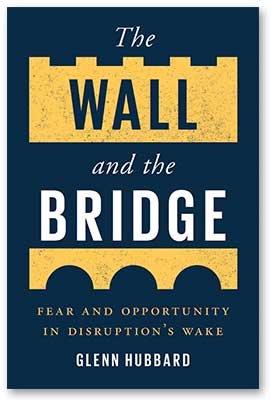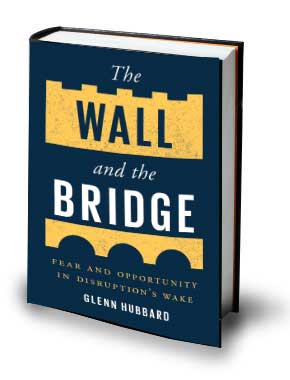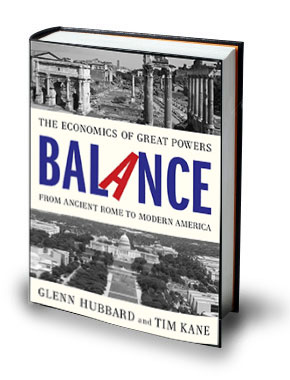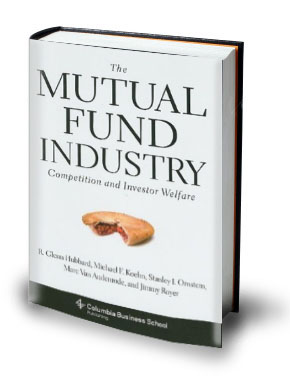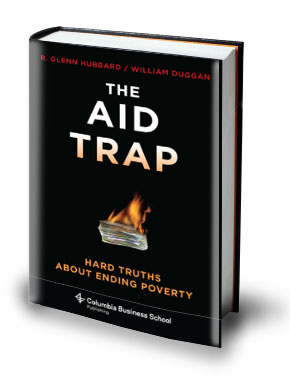 Glenn Hubbard, dean of the Columbia Business School, wants his students to make connections—and not just through networking. He blames the recent financial crisis
on a failure by leaders to successfully see the big picture, focusing
instead on their area of expertise. Not connecting the dots, he says,
was disastrous. In Mr. Hubbard's view, business
schools must prepare students with a broader education in order to
thwart an economic meltdown. To that end, Columbia is deliberately
weaving topics such as decision-making and ethics into classes across
all disciplines.
Glenn Hubbard, dean of the Columbia Business School, wants his students to make connections—and not just through networking. He blames the recent financial crisis
on a failure by leaders to successfully see the big picture, focusing
instead on their area of expertise. Not connecting the dots, he says,
was disastrous. In Mr. Hubbard's view, business
schools must prepare students with a broader education in order to
thwart an economic meltdown. To that end, Columbia is deliberately
weaving topics such as decision-making and ethics into classes across
all disciplines.
The school is also beefing up its disclosure of faculty members' outside activities such as advisory roles, board seats and paid speaking engagements.
Mr. Hubbard came under fire in "Inside Job," the 2010 documentary about the financial crisis, which raised concerns about potential conflicts of interest due to his relationships with financial-services firms and annual earnings of more than $250,000 for serving on the board of MetLife Inc.
Mr. Hubbard, a former chairman of the President's Council of Economic Advisers, spoke with The Wall Street Journal about interdisciplinary learning, preparing students for new career paths and how to teach ethics.
Excerpts:
WSJ: You've taken some heat for how the movie "Inside Job" portrayed your, and professors', disclosures [including dollars earned] of outside activities. Has Columbia changed its approach to any of this?
Mr. Hubbard: Despite what you might have seen in "Inside Job," we have a lot of disclosure. We just tightened it as a faculty, a project we've worked on since 2009. I've always disclosed what I do, my sources of income and relationships, that's how he knew what to ask me. We've now moved to a system where all faculty will do that. Basically, faculty résumés will [show] outside activities just like they [show] publications and teaching.
WSJ: What was the expectation before?
Mr. Hubbard: I've always done it [made disclosures] because I'm a dean. But the faculty did not have to do that. The faculty were always supposed to report if they received money to support research, that's just a matter of professional ethics.
WSJ: A number of schools are tweaking their programs to prepare students for jobs with broader responsibilities. How do you give your students a holistic education?
Mr. Hubbard: It's not simply a matter of drilling people to become greater experts, but [teaching them] how to bring it together. People were functional experts in individual areas but not seeing patterns fit together.
In the first year of the M.B.A. program [we] read a case that teaches students how to ask questions from different angles. We [focus on] General Motors because GM's problems really did unfold over a 20- to 25-year period. It enables students to spot slow-moving train wrecks or slow-moving opportunities.
WSJ: You've said you see a shift in what leadership and management skills are needed for success. How is leadership changing?
Mr. Hubbard: One big change that affects us in the business-school world is that people become leaders much faster. When I was a student, people went through a long period of time becoming an expert in something and then maybe [they] got to be the boss, maybe not. Increasingly, within five years after business school, students are in significant positions of leadership. It's not something that we can punt on when they're in business school.
WSJ: How do you prepare students for that new trajectory?
Mr. Hubbard: We use the work of some of our colleagues on social intelligence to show students what they're good at as a potential leader, and what they're bad at, and help them improve the areas in which they're weak. We have coaching and we do a lot of psychology-based teaching on leadership. Working with students to develop empathy and encouraging followership in people is very important. Every first-year student is part of the Program on Social Intelligence [which focuses on leadership skills].
My view is that leadership and entrepreneurship are teachable subjects. That doesn't mean that you can make somebody into a rock star overnight, but you can unlock the potential.
WSJ: What are some of the most important skills that you hope your graduates leave campus having learned?
Mr. Hubbard: I always say to the students there are three things you've got to do to be a successful leader: Analyze, decide, lead. First, you've got to be able to analyze a problem. And that, frankly, almost any good business-school student can do. Then, you've got to be able to make decisions when you don't have all the information, because in the real world you never do. The third is you've got to be able to persuade other people to go along with the decision you make.
WSJ: What are some other challenges that the newly minted M.B.A.s might face?
Mr. Hubbard: They face two very big forces right now. One is the fact that many of the industries they're working in, particularly financial services, are going to be evolving substantially over the next decade. It's not altogether clear to many of them who's going to wind up on top. The second big thing is the continuing drive toward globalization, meaning that as a young person thinking about bigger and bigger leadership roles, you have to be completely global in your thinking, in where you're working [and] the kinds of experiences you have.
WSJ: Weak ethical guidance has been mentioned as a factor in the financial crisis. How do you try to instill in your students a sense of right and wrong?
Mr. Hubbard: When I became dean there were a lot of schools doing this through standalone ethics classes. My view is students marginalize classes like that.
I don't think students pay attention to it the way they do when it's integrated into your marketing course, into your operations course, into your finance class.
We have cases that are woven through and outside speakers who come in to work with the students. What's really important for young business-school students is to see this as a real problem, looking at a real business person confronted with this issue and how he or she dealt with it.
By Melissa Korn, The Wall Street Journal

